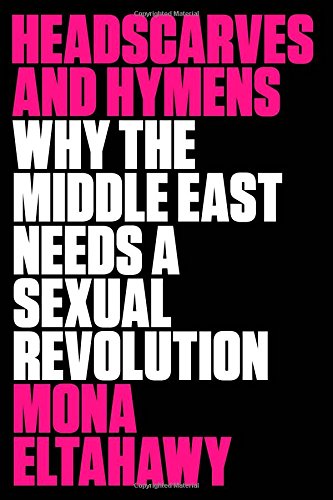Mona Eltahawy published in 2015 the rather interesting and provocative book, Headscarves and Hymens: Why the Middle East Needs a Sexual Revolution. A personal tale of the double standards she met and the personal battles she had had with Islam and its view on the women. Mostly, the book is written within the aspects and fights of feminism and the authors understanding of such in the Middle East.
I wouldn’t call myself a feminist. Despite the fact that I do believe a woman can do, and should be able to do, whatever is in her scope of succeeding with. My own view of a woman is that she is beautiful. She contains many wonders. Much strength. And that she is capable of so much more than what we all initially thinks – including the women themselves. I have had the pleasure to meet many impressive women. My grandmother is one of the women that keeps surprising me. Her strength to keep doing, believing and act the way she believes to be the ultimate truth, impresses me time and time again.
This book focuses on The Middle Eastern woman. It describes the obstacles women face in a patriarchal world, where men are the head of the family and women are considered to be machines only to bring children to the world and to take care of them. The book is a necessary contribution to stir and discuss how we consider women in the Middle East. It do put up important questions as to where the Western politicians alliance lay. And I love how it provoked my else firm understanding of the woman in the Middle East.
Unfortunately, I find that it more than once generalises and speaks into the world of women, she doesn’t necessarily know anything about. She keeps talking about the hypocrisy of the Western world. How they close their eyes towards the Saudi Arabian view on and treatment of women. The thing is that the book is missing a layer of understanding. Not that this would in any way be an excuse for ignoring the problems, but could be an explanation to the Western world’s treatment of the issue. The lack of the overall political layer unfortunately cripples the else interesting subject the books puts forward into the light.
In another example she talks about women in Islam, Judaism and Christianity. That all women under any of these religious affiliations are suppressed by men and a patriarchal worldview. First and foremost it is problematic to write in a tone, in which one expresses that no one should meddle in this, when one points a judgemental finger towards other religious affiliations, one doesn’t seem to know that much about. It almost seems as if, in her view, that her epiphany should destroy every other women’s religious affiliation. The thing is that I am sitting as the receiver of her message thinking, “Hey, I made my own choice. I understand that you felt forced into making yours. But I wasn’t. I chose to become a Christian. I chose to live the way I do. Not because some man stood with a judging mindset towards my female presence and told me to cross my legs and be virtuous”. As a matter of fact I made my choice in a country where I will be viewed as radically different from the norm. It seems to me that Mona Eltahawy describes a situation where being and acting like a Muslim woman is the same as being a part of what in that part of the world is considered the norm. I am not saying that her situation isn’t awful and that we should keep our eyes closed to what for some is a problem. I am saying, that in her mission to spread the word about a hypocrisy that needs attention, she drags along women that isn’t necessarily a victim of the fight. In that, she almost drowns the real victims that needs attention with women that doesn’t.
I remember the moment I decided that I wanted to study religion and religious affiliation. I was in the bazaar of Jerusalem. Standing in the middle of the welter of people that negotiated prices. People discussing. People eating. On my right side, a Muslim man walks proudly towards me. He doesn’t notice anything. His walk reveals a proud mind. Behind him a woman, his wife, is walking, almost running with what almost seemed as an abundance of children swarming around her, demanding her every attention. On my left, a Jewish man comes walking towards me. He doesn’t notice anything in front of him. Not because he seems proud of himself. But his sole attention is to the beautiful woman on his left. He doesn’t care about the world, but looks with wonder. With pride. With amazement. With respect towards the woman he has with him on his right. Since I have learned how religious doctrines are differently interpreted. Unfortunately, Mona Eltahawy does not seem to have understood the same.
From my academic understanding, the problem of having a religious affiliation is only when one person through one’s religious understanding limits the freedom of others. Others who didn’t necessarily chose this worldview. And herein, lies the difference between the religiosity I see emerging in most cases in for instance Denmark, as opposed to the one that lives in some areas where it is a limitation for people who did not chose the affiliation they are “being governed by”.
As black and white things seems to be in this important contribution of a book written for Mona, that is not how black and white the world initially are. Religion is not necessarily a bad thing. It is important to underline and fight for Women’s Rights – but not to forget that there is also the right to belief and other human rights to underline and fight for, which are equally as important.

